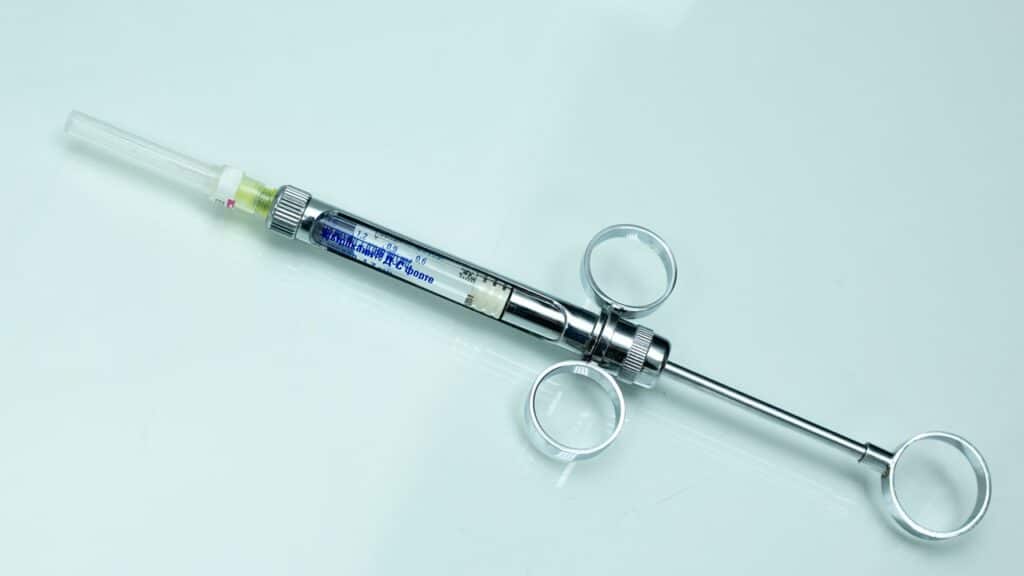Buccal Midazolam Training: A Comprehensive Guide for Care Workers and Nurses

Healthcare is a constantly evolving field that demands continuous learning, especially when it comes to handling severe conditions like epilepsy. For care workers and nurses, understanding how to effectively administer certain treatments is not just beneficial, it is critical.
One such significant area of learning is buccal Midazolam training.
So, let’s take a deep dive into what buccal training involves, its importance, and the crucial role it plays in seizure management.
Table of contents
Understanding Buccal Midazolam
Before we delve into the specifics of buccal training, it’s essential to understand what buccal Midazolam is.
Midazolam is a fast-acting medication extensively used to manage acute seizures in people with epilepsy.
The term ‘buccal’ refers to the method of administration – where health professionals place medicine in the buccal cavity, the space between the gum and cheek, from where it is quickly absorbed into the bloodstream.
This rapid absorption is key in providing swift relief during a seizure, significantly reducing the duration and intensity of the episode.
Buccal Midazolam Training
If you’re working in healthcare and interact with buccal Midazolam, it’s important to have adequate training and competencies around this drug.
So, let’s look at our buccal Midazolam training comprehensive guide for care workers and nurses:
What is Buccal Training?
Buccal training (or also called Buccal Midazolam Training) refers to the education and instruction required to properly administer buccal Midazolam.
Buccal Midazolam is a medication that is delivered through the inner lining of the cheek (buccal mucosa).
It is commonly used in emergency situations to stop or control prolonged seizures, known as status epilepticus.
The training typically covers various aspects, including understanding the appropriate dose, the correct administration technique, and recognizing potential side effects.
Why is Buccal Midazolam Training Important?
The immediate management of a seizure can make a world of difference to an individual suffering from epilepsy.
Well-trained care workers and nurses can provide the timely and effective intervention necessary during such instances.
The ability to administer buccal Midazolam with precision and confidence can drastically minimise the potential dangers that prolonged seizures can pose.
Buccal Midazolam training covers a wide range of critical aspects, including:
- Understanding Epilepsy: The training program commences with an in-depth exploration of epilepsy. It covers the causes, types, symptoms, and impact of this neurological condition, providing a comprehensive understanding of what a patient with epilepsy experiences.
- Administering buccal Midazolam: One of the primary focuses of buccal training is to provide hands-on experience in administering the medication. It involves understanding how to locate the buccal cavity correctly and ensuring the drug is effectively absorbed.
- Familiarisation with Equipment: The training also aims to familiarise healthcare workers with the necessary equipment and tools required to administer buccal Midazolam.
- Aftercare and Observation: Post-administration care is equally vital. Trainees learn how to observe and monitor the individual after the treatment, ensuring their well-being and safety.
- Awareness and Support: The training emphasises the need to create awareness about epilepsy and the importance of establishing a supportive environment for individuals living with this condition.
Do You Need Training to Administer Buccal Midazolam?
Yes, it is essential to receive proper training before administering buccal Midazolam.
While the concept of delivering medication through the buccal route may seem straightforward. It’s really important to understand the specific guidelines, dosage calculations, and administration techniques to ensure the medication’s safe and effective use.
Training also provides important knowledge about when buccal Midazolam is appropriate and when alternative interventions may be necessary.
Find out: Learn how to give Buccal Midazolam / Rectal Diazepam in our Epilepsy Medication Training

Epilepsy medication death is the leading cause of death in children with epilepsy, accounting for approximately 20-30% of all deaths in this population.
Source: Journal: Epilepsia. 2012;53(9):1415-28.
The Risks of Administering Buccal Midazolam Without Training
Administering buccal Midazolam without proper training can pose significant risks and potential harm to the individual receiving the medication.
Here are some of the risks associated with administering buccal Midazolam without training:
1. Incorrect Dosage:
Without proper training, there is a higher likelihood of administering the wrong dosage of buccal Midazolam. Dosage calculations stem from factors such as the person’s weight, age, and specific medical conditions.
Administering an incorrect dose can lead to inadequate seizure control or an overdose, both of which can have serious consequences.
2. Improper Administration Technique:
You can administer Buccal Midazolam by placing the medication between the cheek and gum, allowing for absorption through the buccal mucosa.
Without training, individuals may not be aware of the precise technique required for optimal absorption. Improper administration may result in decreased effectiveness of the medication or delayed seizure control.
3. Delayed Response:
When faced with a seizure or status epilepticus, time is of the essence.
Administering buccal Midazolam without training may lead to delays in providing the medication.
This delay can prolong the seizure and increase the risk of complications, such as injury, respiratory distress, or brain damage.
4. Failure to Recognize Potential Side Effects:
Buccal Midazolam, like any medication, can have side effects.
These may include drowsiness, dizziness, or respiratory depression.
Training helps individuals recognize these potential side effects and take appropriate measures to address them.
Without training, caregivers may not be aware of the signs and symptoms of adverse reactions, potentially compromising the person’s safety.
5. Lack of Knowledge About Alternative Interventions:
Buccal Midazolam is not always the appropriate intervention in every seizure situation.
In some cases, using alternative measures or additional medical attention makes more sense.
Training provides important knowledge on when buccal Midazolam is suitable and when considering other interventions.
Administering buccal Midazolam without training may result in missed opportunities for alternative treatments that may be more effective or necessary.
6. Legal and Ethical Implications:
In many jurisdictions, the administration of medications without proper training or authorization can have legal and ethical implications.
Without the necessary training, individuals may be acting outside their scope of practice or violating regulations.
It is essential to adhere to legal and ethical guidelines to ensure the well-being of both the caregiver and the person receiving the medication.
To mitigate these risks, it is vital that you undertake buccal Midazolam training.
By undergoing training, caregivers and healthcare professionals can acquire the necessary skills, knowledge, and confidence to administer buccal Midazolam safely and effectively.
Training not only reduces the risks associated with medication administration but also ensures that individuals receive the best possible care during seizure emergencies.
Remember, the well-being and safety of the person experiencing a seizure should always be the top priority.
Seeking appropriate training and staying up-to-date with best practices are essential steps towards providing optimal care and minimising the risks associated with administering buccal Midazolam.

According to a study published in the journal Seizure in 2022, the average number of epilepsy medications that people with epilepsy in the UK are taking is 2.4. | Journal: Seizure. 2022;96:106727.
Where to Get Buccal Training?
Several organisations and healthcare providers offer Buccal Midazolam training programs.
These programs are designed to provide healthcare professionals, caregivers, and individuals with the necessary skills and knowledge to administer the medication safely.
Healthcare facilities, such as hospitals, clinics, and epilepsy centres, often provide training sessions for their staff.
Additionally, organisations focused on epilepsy awareness and education may offer buccal Midazolam training to the general public.
At Caring for Care, we offer an epilepsy medication training that covers Buccal Midazolam / Rectal Diazepam.
Do You Need to Refresh Training?
Yes, it is highly recommended to refresh your buccal training periodically.
Medical practices and guidelines evolve over time, and staying up-to-date ensures that you are aware of any changes in best practices for administering buccal Midazolam.
Regular training refreshers also serve as an opportunity to reinforce your knowledge, review administration techniques, and address any questions or concerns you may have.
Keeping your skills current ensures that you can provide the best possible care in emergency situations.
The Benefits of Effective Buccal Training
Effective buccal training offers several benefits for both healthcare professionals and caregivers. Firstly, it gives you confidence and competence in the administration of Buccal Midazolam.
Feeling prepared and knowledgeable about the medication’s correct use can significantly reduce anxiety and stress during emergencies.
This training empowers individuals to take prompt and effective action when faced with a seizure or status epilepticus.
Secondly, proper buccal training ensures the safety of the person receiving the medication.
Understanding the correct dosage and administration technique helps prevent under or over-dosing, which can have serious consequences.
The training also covers potential side effects and adverse reactions, enabling caregivers to identify and respond appropriately in case of an emergency.
Lastly, effective buccal training promotes effective communication and collaboration among healthcare professionals, caregivers, and individuals with epilepsy.
Training sessions often emphasise the importance of sharing accurate medical information, understanding the person’s specific needs, and coordinating care effectively.
This teamwork and shared understanding create a supportive environment that enhances overall care and improves outcomes for individuals with epilepsy.
Steps to Buccal Midazolam Administration
For care workers and nurses, being able to administer buccal Midazolam effectively is the primary goal of this training.
To help illustrate the process, let’s walk through the typical steps involved:
- Preparation: Ensure the necessary equipment, including the pre-filled syringe of buccal Midazolam, is ready and within reach.
- Positioning the Individual: You should position the patient on their side in the recovery position to prevent choking.
- Administering the Medication: Place the syringe into the person’s buccal cavity, and the medication is gently expelled. It’s important not to insert the syringe too deeply to avoid injury.
- Post-Administration Care: After administering the medication, the person should be closely monitored until medical help arrives. It’s also crucial to record the time of drug administration, as this information is beneficial for healthcare professionals.
Remembering that every individual is unique, it is important to adapt the process slightly based on their needs and comfort.
The Role of Expert Trainers in Buccal Midazolam Training
Effective training hinges heavily on the expertise of the trainer.
Knowledgeable and experienced trainers can make a huge difference in how well trainees understand the nuances of buccal Midazolam administration.
They not only provide detailed theoretical knowledge but also demonstrate the practical aspects, ensuring that care workers and nurses are comfortable and confident in administering the medication.
Trainers also play a pivotal role in creating an open environment where trainees can ask questions, share their concerns, and clarify their doubts.
This interactive atmosphere contributes to a more profound and lasting understanding of the subject matter.

According to a study published in the journal Epilepsia in 2020, an estimated 6.5% of people with epilepsy in the UK are not taking their medication as prescribed.
Buccal Training vs. Epilepsy Medication Administration Training
Epilepsy medication administration training and buccal training are both important aspects of providing care for individuals with epilepsy.
Buccal training specifically focuses on the administration of buccal medications, such as buccal midazolam, which is commonly used to treat seizures.
This training equips individuals with the knowledge and skills to safely and effectively administer medication through the buccal route.
On the other hand, epilepsy medication administration training encompasses a broader scope, including various methods of administering different epilepsy medications.
It covers topics such as medication dosage, routes of administration (such as oral, intravenous, or intramuscular), medication interactions, and potential side effects. See full Epilepsy Medication Administration Training Course Content here
While buccal training focuses specifically on buccal medication administration, epilepsy medication administration training provides a more comprehensive understanding of administering different epilepsy medications through various routes.
Both trainings are crucial in ensuring the well-being and safety of individuals with epilepsy, empowering caregivers and healthcare professionals to appropriately administer the required medications.
Enrol in our Buccal Midazolam / Rectal Diazepam course and gain the essential knowledge and skills to administer these life-saving medications.
SEE FULL COURSE CONTENT AND TRAINING DATES AVAILABLE.
Choosing between Buccal Training and Epilepsy Medication Administration Training
The appropriate training for you depends on your specific circumstances.
If you’re a healthcare professional working with individuals with epilepsy and want to learn buccal midazolam administration, buccal training is ideal.
It’s crucial to be trained in administering this life-saving rescue medication for prolonged seizures.
For a broader understanding of epilepsy medication, including different types and administration methods, choose epilepsy medication administration training.
It covers oral, injectable, and rectal medications, emphasizing proper dosage and administration guidelines.
To determine the right course, consult your supervisor or manager who can assess your needs and provide guidance. You can also speak to our course advisors- 01782 563333.
Here is a table that summarizes the key differences between buccal training and epilepsy medication administration training:

Table: Buccal Training vs Epilepsy Medication Administration Training
Frequently Asked Questions
What are the steps for safe administration of buccal midazolam for seizures?
The steps to follow are listed below. Ensure you are well trained before administering medication to anyone and follow necessary guidelines.
How to give midazolam buccally:
- Confirm the patient has a physician order and documented indications for buccal midazolam administration.
- Check medication label for proper name, dose, and expiration. Midazolam typically comes in a syrup concentration.
- Assemble supplies – gloves, oral syringe, suctioning equipment.
- Position patient on their side to prevent aspiration risk. Tilt chin up.
- Draw up correct dose of midazolam into oral syringe, checking twice with another nurse.
- Put on gloves and insert syringe gently into the buccal space between cheek and gums.
- Gently instill the midazolam solution down along the buccal surface.
- Avoid squirting solution forcefully. Allow absorption through membranes.
- Keep patient positioned on side. Monitor for seizure cessation and respiratory depression.
- Document medication, dose, time, effects and notify physician.
When Can it be given?
When buccal midazolam should be given:
- For prolonged seizures lasting more than 5 minutes
- For clusters of multiple seizures without full recovery between
- If seizure emergency medication is prescribed prn for a particular patient
Should buccal midazolam be swallowed?
No, the aim is to have the midazolam absorbed in the cheek pouch rather than swallowed. However, some swallowing may inadvertently occur which can still allow gastrointestinal absorption. Avoid forceful squirting which increases swallowing risk.
What to check before buccal midazolam:
- Verify doctor’s order for midazolam administration
- Check dose is correct for the patient based on prescription
- Confirm the medication is unexpired
- Have proper equipment available – gloves, syringe
- Ensure nothing obstructs the buccal cavity
- Position patient safely on side to prevent aspiration after dose
- Monitor airway, breathing, and oxygen levels after giving
What should I check before midazolam?
- Right patient, medication, dose route, time
- Absence of allergies or contraindications
- Clear buccal area without blockages
- Suction equipment available
- Monitors like pulse oximeter working
- Emergency medications ready if needed
- Doctor and emergency contacts notified
Strict adherence to safety steps prevents errors and adverse events with buccal midazolam.
Conclusion:
For care workers and nurses, buccal Midazolam or an epilepsy medication administration training represents a pivotal addition to their skill set.
With any of these trainings, they can play an active role in managing seizures and improving the quality of life for individuals with epilepsy.
By participating in high-quality training led by proficient trainers, individuals can ensure that they are well-equipped to handle critical situations effectively and confidently.
To sum up, if you are a care worker or nurse dealing with individuals with epilepsy, investing time in buccal Midazolam or epilepsy medication administration training is more than just beneficial – it’s essential.
With any of these trainings under your belt, you will not only enhance your skills but also make a significant difference in the lives of those you care for.
You may want to speak to any of our course advisors on the courses to take. Please send us a mail at enquiries@caringforcare.co.uk or call 01782 563333 to speak to them.
Let us Help you
We’ll help you find the right course for your needs. Tell us a little bit about your situation and what you would like to achieve.
We’ll get back to you within one working day.
